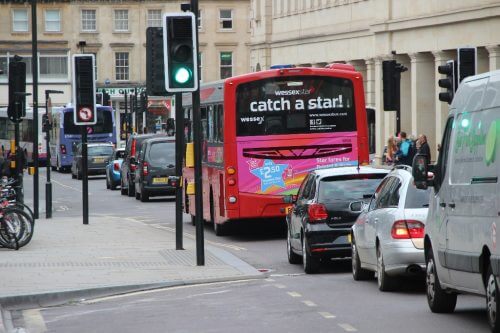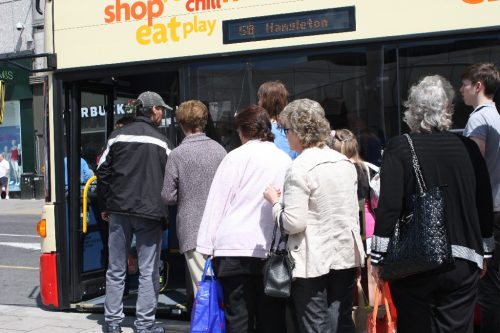
The Transport Select Committee (TSC) has published a report on the Bus Services Bill, which has made a number of recommendations but criticised the Government for not providing information on secondary legislation and guidance.
Partnerships and franchising
On partnerships, franchising and ownership, the report concluded:
- Advanced Quality Partnerships and Enhanced Partnership Schemes have the potential for delivering greater benefits by allowing Local Transport Authorities (LTAs) and operators to work together more intensively, but could entrench the position of dominant operators. The Government’s commitment to take into account the specific aspects of the local bus market in developing the Enhanced Partnership Scheme voting mechanism was commended, but the TSC recommended that the Government should publish further detail of the voting mechanism as soon as possible;
- Franchising has the potential to deliver benefits that cannot be achieved by partnerships. While there are some risks associated with franchising, these are mitigated by existing safeguards in the Bill. The LTA can decide whether or not franchising is appropriate. However, the report concluded that the process set out in the Bill is ‘unnecessarily cumbersome’;
- There may be a case in principle for reinstating the secondary requirement for the Secretary of State’s consent before any individual authority other than a mayoral combined authority can franchise, but this was difficult to assess, in part because the draft guidance was not available. The TSC recommended that the Government must produce more detailed guidance on how the Secretary of State will exercise these powers;
- Franchising is at the heart of the Bill but the TSC was concerned that key elements relating to this provision are still not available for scrutiny, while other parts are only available in draft. The TSC said it was not the first time this had happened and it is unacceptable. It said the Government should commit to publishing all relevant draft secondary legislation and guidance when a Bill is introduced into Parliament;
- The question of whether incumbent operators would suffer a loss from franchising is a complex one, but franchising does not mean operators already providing bus services in the market cannot compete; they must compete for the market rather than for passengers. There is no case for compensation for operators;
- Franchising and partnership schemes have the potential to partially address the funding pressures currently facing bus services by increasing full fare passenger numbers. The devolution of BSOG where franchising is implemented was welcomed, but the committee recommended that BSOG also should be devolved to those authorities who implement an Enhanced Partnership Scheme or Advanced Quality Partnership;
- The Bill’s emphasis on consultation with bus users and employee representatives was welcomed. The TSC suggested an amendment requiring LTAs proposing Enhanced Partnership Schemes to consult with the appropriate representatives of any affected employees. This would bring the provisions around employee representation for Enhanced Partnership Schemes in line with those for franchising and Advanced Quality Partnerships. It also supported the proposal to allow communities to designate bus routes as community assets;
- On cuts to local authority budgets, the Bill can only be part of the solution in protecting local transport services in isolated communities. The TSC said the Government must explain how its devolution agenda will help to support local communities to maintain critical bus services that require financial support;
- There are some circumstances, for instance where no private operator is willing and able to operate socially necessary services, where it would be appropriate for a LTA or group of authorities to set up their own operator. The TSC accepted that there was a risk of a conflict of interest where the authority has decided to implement franchising and that such a conflict could seriously delay or even prevent a franchising scheme. However, it said the prohibition on all new municipal operators was a disproportionate response, and it encouraged LTAs to assess the benefits of partnerships and franchising first. It said the Government should produce guidance setting out the measures it expects LTAs to put in place to ensure that an arm’s length relationship is maintained.

Data, ticketing and accessibility
Three further topics were highlighted on the subjects of accessibility, open data and ticketing, where the TSC made conclusions and recommendations. These were:
- Audio-visual equipment on buses as standard is ‘long overdue.’ The Government’s commitment to bring forward regulations under the Bill relating to audio-visual was welcomed. The TSC said the Government should ensure that bus users and their representatives are involved in the development of the regulations and in assessing their impact after they have been implemented;
- The Government’s failure to prepare the draft open data regulations in time means it has been impossible for the TSC or the House of Lords to assess the effect of these provisions on operators. The Government’s amendments in the Lords only go some way to mitigating the issue, and it should publish an update on its previous open data policy including, ideally, draft regulations, to allow Parliament to better assess the impact that these provisions are likely to have on industry;
- The TSC welcomed the Advanced Ticketing Scheme provisions as a tool to encourage simpler and more integrated ticketing, but said more must be done to ensure that innovation is encouraged and not hampered. It said within six months of Royal Assent, the DfT should produce guidance which supports LTAs in developing ticketing schemes that do not impede newer technologies, are not a disproportionate burden on operators, and which pay due regard to the accessibility needs of different groups.
Road conditions and congestion
A small set of conclusions and recommendations were made on the subjects of roads and congestions. These were:
Congestion is not the only issue facing the bus industry, but it is a real threat in some areas. LTAs and operators need to fully understand the effects of congestion and other factors on bus speeds and performance. The TSC said TfL already performs admirably in this regard and other LTAs can learn from them. It said LTAs and operators should be encouraged to build performance and reporting frameworks into their partnership and franchising arrangements, and the DfT should produce guidance within six months of Royal Assent to assist authorities;
The TSC was sympathetic to the aims of the House of Lords in passing the amendment to allow local transport authorities which are implementing Advanced Quality Partnerships to have greater enforcement powers over traffic offences. It agreed that the devolution of moving traffic offence powers requires further consideration, but said linking moving traffic offences to the bus regulatory structure is illogical and will add further unnecessary discrepancies between the powers held by different local authorities.
The body of the report did mention that operators said congestion, rather than regulatory structure, is the most serious issue facing the industry, highlighted by a recent drop in passengers in London.
The TSC said it had also received evidence ‘putting the problem of congestion in a wider context.’ DfT figures from the 2011 ‘Lost scheduled bus mileage by metropolitan area’ survey (more recent data was not available as the survey was discontinued after October 2011) showed that outside of London, factors within operator control – such as staffing or mechanical issues – were a bigger cause of lost scheduled bus mileage than congestion.
The TSC added that it had heard little evidence from operators about how they were managing these issues and said ‘there is clear potential of benefits for the passenger where LTAs are able choose the regulatory structure which is most appropriate to their local area.’
Committee summary
Summarising the report, the committee said: “Bus services are a vital lifeline for local communities. However, bus passenger numbers are in long term decline.
“Concerns have been expressed about the impact of deregulation in many places. These include lack of competition, high fares and cuts in services. Local authorities and operators face a number of challenges if they are to provide the affordable, accessible and comprehensive bus networks.
“The Bus Services Bill goes some way in helping overcome these challenges. We welcome the Government’s approach in giving local authorities the option of implementing new forms of partnership or franchising, based on what is most appropriate to local needs.
“However, the Bill as introduced into the House of Lords sets out an unnecessarily cumbersome process for local authorities who wish to franchise.
“The prohibition on new municipal bus operators is one of the most controversial elements of the Bill. We recognise that the Government has legitimate concerns about the risk of a conflict of interest where a franchising authority also owns an operator. However, local authorities should have the freedom to set up an operator if that is the best solution for their community.
“We encourage local authorities to assess the benefits of partnerships and franchising before they consider setting up a municipal bus operator. We call on the Government to support local authorities in managing any real or perceived conflict of interest which may arise.
“The Bill provides an opportunity to transform the collection and provision of information about bus services. We heard powerful testimony as to the impact that audio-visual equipment can have in improving access to buses. The Government’s commitment to bring forward regulations on audio-visual standards for buses is encouraging, but needs to be accompanied with a deadline.
“We heard evidence of confusing and complicated ticketing in many parts of the country, and are encouraged by the aspects of the Bill which give local authorities the power to introduce simplified systems. However, the Bill should encourage rather than hamper innovation. We encourage the Government to work with industry to develop guidance and, where necessary, to play a role in co-ordinating developing technology to minimise unnecessary complexity.
“Congestion is a significant threat to the bus industry in many areas. The DfT should develop guidance for local authorities on incorporating relevant performance and reporting frameworks into partnership and franchising agreements. We repeat our previous call for the Government to bring into force existing statutory provisions which would allow local authorities to enforce moving traffic offences should they so wish.
“We regret that our scrutiny of the Bill has been hampered by the Government’s failure to publish key secondary legislation and guidance. It is unacceptable for governments to place enabling Bills before Parliament without providing a clear indication of how the powers in the Bill will be used in practice. The Government must produce more detailed guidance on the Secretary of State’s franchising consent powers and the open data provisions without delay.
“In future, the Government should commit to publishing all relevant draft secondary legislation and guidance when a Bill is introduced into Parliament.”
Chairman’s comment
Chairman of the Transport Committee, Louise Ellman MP, commented: “Bus services face a number of challenges from deregulation, increasing fares and cuts to services on local routes. Yet they are a vital lifeline for communities up and down the country. A reliable service allows individuals to access employment, education and public services, and ensure that they can fully participate in society. Even non-bus users agree that a good bus network is important for their area.
“A recent report predicted a 55% growth in all traffic by 2040. Buses can make a real impact towards reducing congestion not only in metropolitan areas, but increasingly in smaller market towns and rural areas.
“In this Bill, there are possibilities for local authorities to implement new forms of partnership or franchising based on what’s best for their communities, but Committee scrutiny of the franchising process was hindered by a lack of information. We expect to see all relevant draft secondary legislation and guidance when the Bill is introduced into Parliament.
“There is a lot to welcome in this Bill. By giving local authorities new powers and offering practical measures such as improved passenger information and services, these proposals have the potential to bring about significant improvements for both passengers and communities.”

